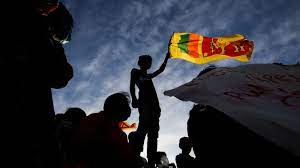Colombo, July 7: The United Kingdom and New Zealand have joined a growing list of countries that has asked its citizens to avoid non-essential travel to Sri Lanka, as the island nation continues to reel under an unprecedented economic crisis that has caused an acute shortage of essentials and sparked incidents of violent clashes.
Sri Lanka is going through the worst economic crisis since its independence from Britain in 1948, and needs to obtain at least USD 4 billion to tide over the acute shortage in foreign exchange reserves.
On Wednesday, the UK’s Foreign Office put Sri Lanka on its ‘No Go’ travel list.
“Sri Lanka is experiencing a severe economic crisis which has led to shortages of basic necessities including medicines, cooking gas, fuel and food. There is a major shortage of fuel (diesel and petrol) affecting transport, businesses, and emergency services. There are daily power cuts due to electricity rationing,” UK’s Foreign Office said.
“This has led to protests and violent unrest. Further protests, demonstrations, roadblocks and violent unrest could occur at short notice,” it added.
Similarly, New Zealand on Wednesday also issued a travel advisory refraining its citizens from travelling to Sri Lanka due to “the multiple incidents of violent clashes in public places have been reported in the country and it has resulted in a number of deaths and hospitalisations along with the destruction of property and burning of houses.”
Tourism accounts for 5 per cent of Sri Lanka’s GDP, with India, China and the UK being the country’s main markets.
However, the pandemic and the Easter Sunday attack in 2019 has severely dented the earnings from this sector and remittances and outflows on foreign investment over the last three years.
In 2019, almost 200,000 British tourists visited Sri Lanka. That number has dipped to just over 55,000 in 2020 as a result of pandemic-related travel restrictions, according to a report in The Independent newspaper.
The current warning from the UK comes after a similar travel advisory was put in place on May 16, following a series of violent clashes and protests in the face of a nationwide economic crisis, the report said.
It was then lifted on 10 June, with Sri Lankan authorities saying that tourism would be welcomed on an island that was hit hard first by the pandemic travel shutdown, then the present economic crisis, it added.
The US, European Union, Canada, Australia and Ireland are the other nations that continue to main travel advisories against Sri Lanka.
Tourist arrivals to Sri Lanka for the month of June totalled 32,856, recording a marginal increase when compared with the previous month, largely influenced by Australia’s cricket team’s tour of Sri Lanka, which commenced in early June, according to the Daily Mirror newspaper.
For the first half of 2022, a total of 411,337 tourists visited Sri Lanka against the 17,000 tourists in the COVID-hit first half of 2021, it said.
The Sri Lanka Tourism Development Authority Chairman Priantha Fernando said steps would be taken to “soften” the impact of such warnings.
“We are continuously working on providing a hassle-free experience to tourists who visit #SriLanka,” he said in his tweet.
On Wednesday, Sri Lankan President Gotabaya Rajapaksa urged his Russian counterpart Vladimir Putin to restart the services of the Russian flag carrier Aeroflot to the country.
The two leaders also agreed to bolster bilateral ties in sectors like tourism, trade and culture.
Last week, the Sri Lankan government announced that only essential services will operate from midnight till July 10 and all other operations will be temporarily suspended as the country of 22 million faced an acute fuel shortage.
In June, the Sri Lankan government announced curbs on fuel distribution, and shut down schools and limited public transport.
Sri Lanka’s total foreign debt stands at USD 51 billion.
The Sri Lankan economy has virtually come to a grinding halt after it has run out of foreign exchange reserves to import fuel.
Sri Lankans continue to languish in long fuel and cooking gas queues as the government is unable to find dollars to fund imports. (PTI)


